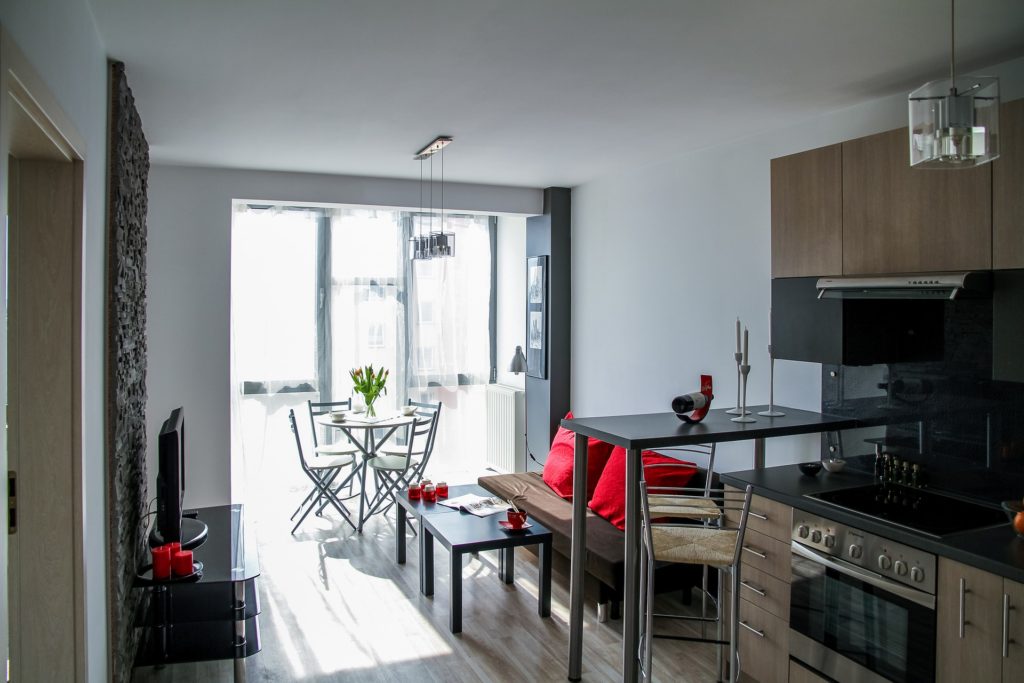Creating a budget to rent your first apartment can be a little tricky, especially if you’re also new to managing your money. Maybe you just graduated from college, got your first full-time job, or have some friends or a significant other willing to split the rent.
Whatever the case when reviewing your budget, you may realize it might be more costly than you thought.
Importance of Budgeting for Your First Apartment
Depending on where you live, you might find that renting is more expensive than you originally anticipated. Or perhaps you discover that your salary doesn’t get you as far as you had hoped.
Either way, it’s important to know how to budget for your first apartment —or living situation. You don’t want to have to break a lease because you find that you can’t afford rent.
How to Start Your Budget
The following process will guide you in starting your first budget:
- Figure out your monthly income.
- Figure out all of your monthly expenses.
- Subtract your expenses from your income to see what’s left.
- Give yourself a small buffer, and that’s how much you have to spend on your living expenses.
If it’s your first time living on your own without any financial help, you might have to adjust your expectations and numbers a few times so they are realistic. You likely didn’t have to deal with all of these expenses during college or while living with your parents, so give your best estimate for what you’ll spend on each item. For example, you’ll need to estimate how much money you’ll spend on groceries, gas, entertainment, and insurance.
Budgets aren’t set in stone and can be modified to reflect your actual living expenses. You can change your budget after paying a few months of expenses and you’ve compared your actual spending to the budget.
How to Account for Living Expenses
Finding an apartment that includes utilities in the rent can simplify your budget, however, this option isn’t always available. If utilities such as gas, electric, and water are not included in the rent, you will need to factor them, along with other common living expenses such as renter’s insurance, into your apartment budget as follows:
- Rent. This amount should stay the same each month for the duration of your rental contract unless you get a monthly rental agreement, which is not binding but also doesn’t prevent rent increases.
- Electric. Tenants typically pay for this utility. Because you’re in an apartment, your electricity bill should be fairly small each month.
- Water: Landlords also often pay your water bill. However, in certain cases, you may need to pay for this utility and want to be sure you can make the monthly payments.
- Internet and Cable. You’ll be responsible for this charge, and you may be able to get a bundled service from your cable or cell phone provider at a lower rate. In addition, cable may be optional if you don’t watch much television.
- Renter’s insurance. This covers all of your belongings in your apartment in case of theft or certain types of damage and is usually fairly low-cost.
Check out real estate advertisements for rentals in your area to see how they are priced and what utilities are included. This will give you a good idea of available rentals in terms of determining your budget.
Also, be aware of these common fees that many apartment complexes and landlords charge:
- Garbage pickup
- Pest control
- Parking
- Storage/garage
- Administration fees
Not all apartments come with these fees, however, it’s a good rule to ask if they do. Some fees could occur on a monthly basis, while others may be a one-time charge.
You might find you can afford the monthly rent without an issue, but the upfront costs to move, such as security deposit seem overwhelming.
How to Keep Costs Down
If you determine that you cannot afford to pay rent for a desired type of apartment or location, you can refocus your goals to gain additional savings.
Consider the location and housing:
- Living in a studio or a bedsitter is likely cheaper than living in a one- or two-bedroom apartment.
- Living near a city center is going to cost more than living on the outskirts of the city.
- Living in the middle of nowhere might leave you with high transportation costs.
If your budget cannot accommodate rental costs in the desired location, consider living with one or two roommates.
Weigh the pros and cons of location and housing to determine an acceptable situation that can accommodate your budget. For example, living near your job or in the city can be the most strategic decision, as you can give up your car and all of its expenses.
How Much Rent Should You Pay?
There’s a popular rule-of-thumb that states your monthly rent shouldn’t be more than one-third of your monthly income, and many apartment complexes—and landlords—follow this rule For example, if you earn 30,000 a month, you can qualify for an apartment that costs 10,000 a month.
There’s another rule-of-thumb that says living expenses shouldn’t exceed around 25% of your salary. Therefore, if you earn Kes 30,000 a month, you should be looking in the Kes 7,500 range for rent, so that you can cover utilities and still have two-thirds of your monthly income left.
Conclusion
Consider your options and take all of the fees into consideration when choosing an apartment. Not all places are the same, so it’s important to note all of the fees when making comparisons. For example, one apartment may have a lower base rent but higher monthly fees, making it less of a deal.
Run all of the numbers, ask questions, and start saving month-by-month for those initial move-in costs. You’ll be ready to move before you know it.

